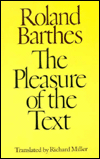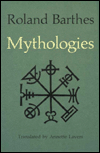Foucault: A Lover’s Discourse About Madness and the Media
By Steve Hoenisch
Copyright 1996-2015 Steve Hoenisch
www.Criticism.Com
1 Barthes’ Anti-Hero
Roland Barthes, writing in the early 1970s, begins The Pleasure of the Text with these words: 
“Imagine someone … who abolishes within himself all barriers, all classes, all exclusions, not by syncretism but by simple discard of that old specter: logical contradiction; who mixes every language, even those said to be incompatible; who silently accepts every charge of illogicality, of incongruity; who remains passive in the face of Socratic irony (leading the interlocutor to the supreme disgrace: self-contradiction) and legal terrorism (how much penal evidence is based on a psychology of consistency!). Such a man would be the mockery of our society: court, school, asylum, polite conversation would cast him out: who endures contradiction without shame? Now this anti-hero exists: he is the reader of the text at the moment he takes his pleasure.”1
With but a few minor revisions and reservations, this excerpt could be used to describe Michel Foucault. Barthes, of course, was not explicitly writing of Foucault, but I find it hard to fathom that he could not have made the connection, at least fleetingly, as he was composing the passage. Or, more dramatically, perhaps Barthes had just been reading Foucault, taking his pleasure, when he had the thought of an anti-hero reading the anti-hero. For it is Foucault who rises above the Cartesian Weltanschauung to show us what lies beyond its arbitrary structures, for it is Foucault who reverses the paradigm, making a mockery of court in Discipline and Punish and of asylum in Madness and Civilization. Taking Barthes’s passage in turn, it is 
 Foucault who abolishes the exclusions of the past and discards the arbitrary constraints of reason, Foucault who reexamines and reconnects aspects of language said to have been irreconcilable, Foucault who reveals the ultimate philosophical irony: truth often lies not so much in scientific method, with its birth perhaps in the Socratic method, but in discourse. Truth, that is, no longer falls within the logical confines of the Socratic method but within the discourse of it, within an analysis of established categories of language, thought, and history.
Foucault who abolishes the exclusions of the past and discards the arbitrary constraints of reason, Foucault who reexamines and reconnects aspects of language said to have been irreconcilable, Foucault who reveals the ultimate philosophical irony: truth often lies not so much in scientific method, with its birth perhaps in the Socratic method, but in discourse. Truth, that is, no longer falls within the logical confines of the Socratic method but within the discourse of it, within an analysis of established categories of language, thought, and history.
But even though the lines of The Pleasure of the Text excerpted above can be interpreted as Barthes’s late-career homage to Foucault’s postmodernism, Foucault would dispute the ability of semiological analysis to detect a singular, over-arching meaning or myth under the cloak of signifier and signified, as Barthes and Baudrillard often attempt to do. In Mythologies, for example, Barthes writes: “What wrestling is above all meant to portray is a purely moral concept: that of justice.”2 In another essay in Mythologies, Barthes acknowledges the “quick-change artistry of plastic” but then goes on to say that “plastic is, all told, a spectacle to be deciphered: the very spectacle of its end-products”3 (with spectacle being a somewhat technical term meaning “the interplay of action, representation and alienation in man and in society”4). For Barthes, plastic becomes the ultimate sign of transmutation: “Plastic, sublimated as movement, hardly exists as substance.”5 In fact:
example, Barthes writes: “What wrestling is above all meant to portray is a purely moral concept: that of justice.”2 In another essay in Mythologies, Barthes acknowledges the “quick-change artistry of plastic” but then goes on to say that “plastic is, all told, a spectacle to be deciphered: the very spectacle of its end-products”3 (with spectacle being a somewhat technical term meaning “the interplay of action, representation and alienation in man and in society”4). For Barthes, plastic becomes the ultimate sign of transmutation: “Plastic, sublimated as movement, hardly exists as substance.”5 In fact:
“The hierarchy of substances is abolished: a single one replaces them all: the whole world can be plasticized, and even life itself since, we are told, they are beginning to make plastic aortas.”6
2 “An Ever-Changing Sameness”
The media are a bit like plastic themselves: They are, in Max Horkheimer and Theodor W. Adorno’s words, “an ever-changing sameness.” And, also like plastic, the whole world, life itself, is being turned into media. Barthes’s playfulness notwithstanding, however, no sign, no word, contains a singular interpretation for Foucault, even perhaps as metaphor. Not even plastic, though the word is of course used here by Foucault in its material sense:
ever-changing sameness.” And, also like plastic, the whole world, life itself, is being turned into media. Barthes’s playfulness notwithstanding, however, no sign, no word, contains a singular interpretation for Foucault, even perhaps as metaphor. Not even plastic, though the word is of course used here by Foucault in its material sense:
“Between word and image, between what is depicted by language and what is uttered by plastic form, the unity begins to dissolve; a single and identical meaning is not immediately common to them. And if it is true that the image still has the function of speaking, of transmitting something consubstantial with language, we must recognize that it already no longer says the same thing…”7
Foucault is speaking of painting, but the same might be said about the mass media, not only of their images but also of their signs, their representations, their references: their language. Why? A liberation from reason, an unfolding into madness. A liberation that “derives from a proliferation of meaning, from a self-multiplication of significance, weaving relationships so numerous, so intertwined, so rich, that they can no longer be deciphered except in the esoterism of knowledge. Things themselves become so burdened with attributes, signs, allusions that they finally lose their own form. Meaning is no longer read in an immediate perception, the figure no longer speaks for itself; between the knowledge which animates it and the form into which it is transposed, a gap widens.”8
3 Foucault and Media Analysis
This excerpt captures quite precisely the application of Foucault’s postmodernism to media analysis. Rendered  thus, Foucault’s theory bears a direct similarity to Derrida’s notion of differance: there is at once the difference, or contrast, of signs in a structural system that produces meaning and the endless deferral of meaning. That is, there is no “final or fixed point or privileged, meaning-determining relationship with the extralinguistic world.”9
thus, Foucault’s theory bears a direct similarity to Derrida’s notion of differance: there is at once the difference, or contrast, of signs in a structural system that produces meaning and the endless deferral of meaning. That is, there is no “final or fixed point or privileged, meaning-determining relationship with the extralinguistic world.”9
Hence: there is not much to analyze, for meaning is fleeting, perspectival, perhaps even self-indulgent, though even that is somewhat contradictory since there is no subject. Analysis itself, especially of the kind steeped in reason, becomes irrelevant, an anachronism. Postmodernism, then, becomes not so much an explanation of media content as an acknowledgement that there are myriad explanations behind any particular sign or image: “So many diverse meanings are established beneath the surface of the image that it presents only an enigmatic face.”10
But perhaps I’m construing Foucault’s postmodernism too broadly. For there is a disjunction of sorts between Foucault’s own theory and the methodology that he uses to analyze histories and texts. Thus, a better indicator of how Foucault’s thought could be used to analyze the mass media and their relations to society may lie more in his methodology than in his theory: a questioning and analysis of categorization and its relations to power, for both are present in abundance in the mass media, including such categories as objectivity as truth.
How, specifically, does Foucault develop his analyses? First, it is a genealogy of sorts, and a questioning of the external conditions of production. The rest of the answer comes from Foucault in Madness and Civilization. In this excerpt the word “media” could be substituted for the first instance of the word “madness”:
“To write the history of madness thus will mean the execution of a structural study of an historical ensemble – notions, institutions, juridical and police measures, scientific concepts – which holds captive a madness whose wild state can never in itself be restored.”11
4 Notes
Roland Barthes, The Pleasure of the Text,p. 3. Italics in original.

Roland Barthes, Mythologies, p. 21.
Ibid. p. 97.
Ibid. p. 7. Translator’s Note.
Ibid. p. 98.
Ibid. p. 99.
Michel Foucault, Madness and Civilization: A History of Insanity in the Age of Reason, trans. Richard Howard (New York: Random House, 1965), p. 18. Italics in original.
Ibid. pp. 18-19.
Simon Blackburn, The Oxford Dictionary of Philosophy (Oxford, U.K.: Oxford University Press, 1996), p. 105.
Michel Foucault, Madness and Civilization, p. 20.
Foucault, quoted by Jacques Derrida, Writing and Difference, trans. Alan Bass (Chicago: University of Chicago Press, 1978), p. 44.